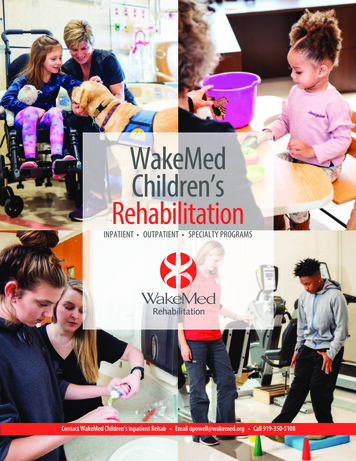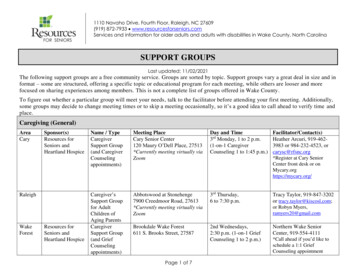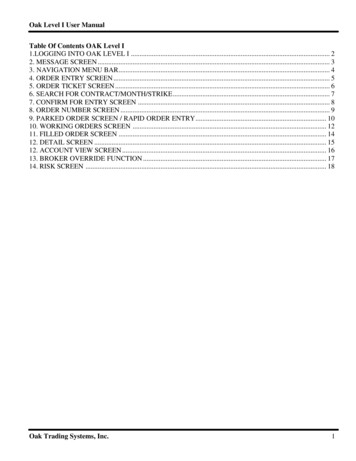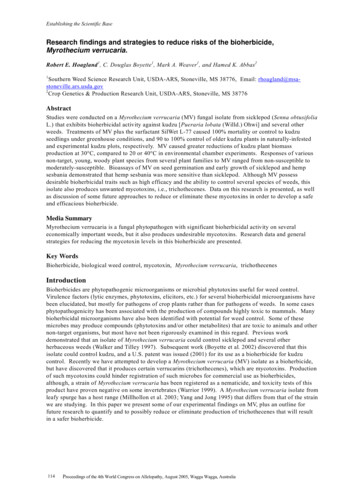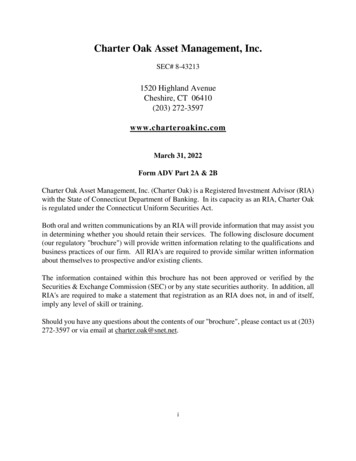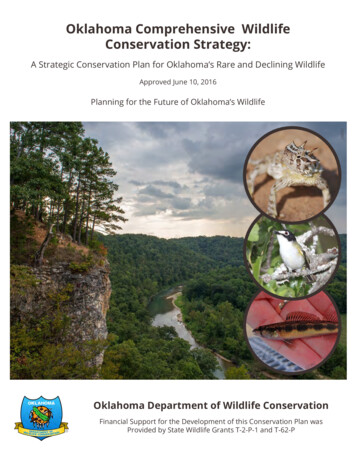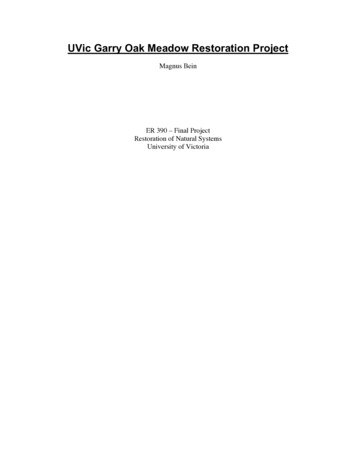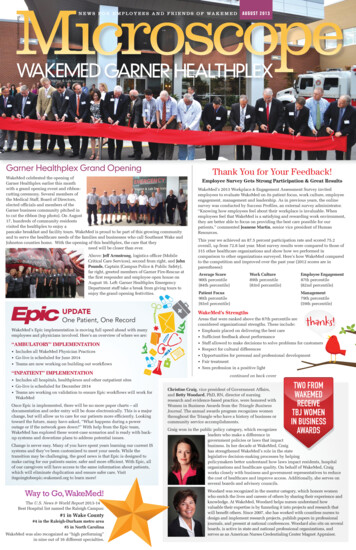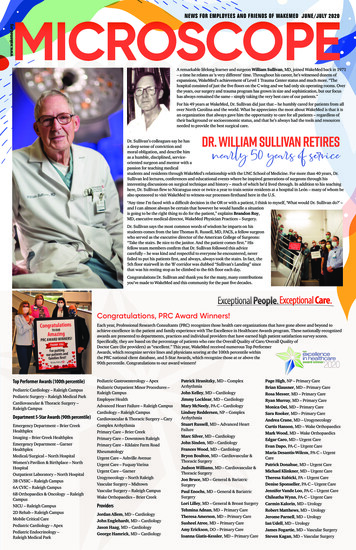
Transcription
www.wakemed.orgNEWS FOR EMPLOYEES AND FRIENDS OF WAKEMED JUNE/JULY 2020A remarkable lifelong learner and surgeon William Sullivan, MD, joined WakeMed back in 1971– a time he relates as ‘a very different’ time. Throughout his career, he’s witnessed dozens ofexpansions, WakeMed’s achievement of Level 1 Trauma Center status and much more. “Thehospital consisted of just the five floors on the C wing and we had only six operating rooms. Overthe years, our surgery and trauma program has grown in size and sophistication, but our focushas always remained the same – simply taking the very best care of our patients.”For his 49 years at WakeMed, Dr. Sullivan did just that – he humbly cared for patients from allover North Carolina and the world. What he appreciates the most about WakeMed is that it isan organization that always gave him the opportunity to care for all patients – regardless oftheir background or socioeconomic status, and that he’s always had the tools and resourcesneeded to provide the best surgical care.Dr. Sullivan’s colleagues say he hasa deep sense of conviction andmoral obligation, and describe himas a humble, disciplined, serviceoriented surgeon and mentor with apassion for teaching medicalstudents and residents through WakeMed’s relationship with the UNC School of Medicine. For more than 40 years, Dr.Sullivan led lectures, conferences and educational events where he inspired generations of surgeons through hisinteresting discussions on surgical technique and history – much of which he’d lived through. In addition to his teachinghere, Dr. Sullivan flew to Nicaragua once or twice a year to train senior residents at a hospital in León – many of whom healso sponsored to visit WakeMed to witness our processes firsthand here in the U.S.“Any time I’m faced with a difficult decision in the OR or with a patient, I think to myself, ‘What would Dr. Sullivan do?’ –and I can almost always be certain that however he would handle a situationis going to be the right thing to do for the patient,” explains Brandon Roy,MD, executive medical director, WakeMed Physician Practices – Surgery.Dr. Sullivan says the most common words of wisdom he imparts on hisstudents comes from the late Thomas R. Russell, MD, FACS, a fellow surgeonwho served as the executive director of the American College of Surgeons:“Take the stairs. Be nice to the janitor. And the patient comes first.” Hisfellow team members confirm that Dr. Sullivan followed this advicecarefully – he was kind and respectful to everyone he encountered, neverfailed to put his patients first, and always, always took the stairs. In fact, the5th floor stairwell in the ‘B’ corridor was dubbed “Sullivan’s Landing” sincethat was his resting stop as he climbed to the 6th floor each day.Congratulations Dr. Sullivan and thank you for the many, many contributionsyou’ve made to WakeMed and this community for the past five decades.Congratulations, PRC Award Winners!Each year, Professional Research Consultants (PRC) recognizes those health care organizations that have gone above and beyond toachieve excellence in the patient and family experience with The Excellence in Healthcare Awards program. These nationally-recognizedawards are presented to departments, practices and individual providers that have earned high patient satisfaction survey scores.Specifically, they are based on the percentage of patients who rate the Overall Quality of Care/Overall Quality ofDoctor Care (for providers) as “excellent.” This year, WakeMed received numerous Top PerformerAwards, which recognize service lines and physicians scoring at the 100th percentile withinthe PRC national client database, and 5-Star Awards, which recognize those at or above the90th percentile. Congratulations to our award winners!Patrick Hranitzky, MD – ComplexArrhythmiaPage High, NP – Primary CareJohn Kelley, MD – CardiologyRosa Messer, MD – Primary CareEmployee HealthJimmy Locklear, MD – CardiologyRyan Murray, MD – Primary CareAdvanced Heart Failure – Raleigh CampusMary McNeely, PA-C – CardiologyMonica Oei, MD – Primary CareCardiology – Raleigh CampusLindsey Reddersen, NP – ComplexArrhythmiaSara Rooker, MD – Primary CareStuart Russell, MD – Advanced HeartFailureCurtis Hanson, MD – Wake OrthopaedicsTop Performer Awards (100th percentile)Pediatric Gastroenterology – ApexPediatric Cardiology – Raleigh CampusPediatric Outpatient Minor Procedures –Raleigh CampusPediatric Surgery – Raleigh Medical ParkCardiovascular & Thoracic Surgery –Raleigh CampusDepartment 5-Star Awards (90th percentile)Cardiovascular & Thoracic Surgery – CaryEmergency Department – Brier CreekHealthplexComplex ArrhythmiaImaging – Brier Creek HealthplexPrimary Care – Downtown RaleighEmergency Department – GarnerHealthplexPrimary Care – Kildaire Farm RoadMedical/Surgical – North HospitalUrgent Care – Ashville AvenueWomen’s Pavilion & Birthplace – NorthHospitalUrgent Care – Fuquay VarinaOutpatient Laboratory – North Hospital3B CVSIC – Raleigh Campus6A CVIC – Raleigh Campus6B Orthopaedics & Oncology – RaleighCampusPrimary Care – Brier CreekRheumatologyUrgent Care – GarnerUrogynecology – North RaleighVascular Surgery – MidtownVascular Surgery – Raleigh CampusWake Orthopaedics – Brier CreekNICU – Raleigh CampusProviders2D Rehab – Raleigh CampusJordan Allem, MD – CardiologyMobile Critical CareJohn Englehardt, MD – CardiologyPediatric Cardiology – ApexJason Haag, MD – CardiologyPediatric Endocrinology –Raleigh Medical ParkGeorge Hamrick, MD – CardiologyMarc Silver, MD – CardiologyJohn Sinden, MD – CardiologyFrances Wood, MD – CardiologyBryon Boulton, MD – Cardiovascular &Thoracic SurgeryJudson Williams, MD – Cardiovascular &Thoracic SurgeryBrian Klausner, MD – Primary CareAndrea Crane, MD – UrogynecologyMark Wood, MD – Wake OrthopaedicsEdgar Caro, MD – Urgent CareEvan Dapo, PA-C – Urgent CareMaria Desantis-Wilcox, PA-C – UrgentCarePatrick Donahue, MD – Urgent CareMichael Klinkner, MD – Urgent CareJon Bruce, MD – General & BariatricSurgeryTheresa Kubicki, PA – Urgent CarePaul Enochs, MD – General & BariatricSurgeryJennifer Vande Loo, PA-C – Urgent CareLori Lilley, MD – General & Breast SurgeryCarmin Kalorin, MD – UrologyTehmina Adnan, MD – Primary CareRobert Matthews, MD – UrologyTheresa Amerson, MD – Primary CareJerome Parnell, MD – UrologySusheel Atree, MD – Primary CareIan Udell, MD – UrologyAmy Erickson, DO – Primary CareJames Fogartie, MD – Vascular SurgeryIoanna Giatis-Kessler, MD – Primary CareSteven Kagan, MD – Vascular SurgeryDenise Sponseller, PA-C – Urgent CareChileatha Wynn, PA-C – Urgent Care
BEHAVIORAL HEALTH SERVICES EXPAND .VIRTUALLYAccording to Modern Healthcare, more than 44 million adults suffer from identifiedmental health concerns and yet, approximately 60% don’t receive any treatment. A newand innovative approach to treatment at WakeMed aims to change that. WakeMed ispleased to now offer adult and pediatric patients real-time access to behavioral healthservices virtually – either during regularly scheduled appointments at any WakeMedprimary care practice or from the comfort of home.“The most common barriers foraccessing mental health servicesinclude: cost/lack of insurancecoverage, access to services, andthe stigma associated withseeking care,” explains JessicaTomasula, PhD, licensedpediatric psychologist andmanager of behavioral healthservices at WakeMed Children’s.“This program addresses all ofthese concerns by making itconvenient, easy andconfidential for patients to getthe care they need.”With generous support from TheDuke Endowment, WakeMed’steam of behavioral healthprofessionals can be contacted right from the primary care or behavioral health officeusing a video monitor. For patients, this means on-demand care – within five minutes –from experts who are ready to listen, support and discuss any mental health questionsor concerns.This team of licensed clinicians, psychiatrists and health coaches delivers acomprehensive, integrated approach to support physical and mental health. Incollaboration with WakeMed primary care providers, to help identify and addressbehavioral health needs including anxiety and depression, pain management, poorsleep, diet and exercise as well as stress management.The Duke Endowment’s 1.6 million grant to the WakeMed Foundation made theexpansion of this much-needed virtual behavioral health care offering – a plan twoyears in the making – a reality.Currently, WakeMed Virtual Behavioral Health is available to offer support and servicesMonday through Friday, from 8 am to 5 pm. For information, call WakeMed PrimaryCare at 919-350-1700 or WakeMed Pediatrics at 919-235-6505.CODE MEDICWhen it comes to our patients, we’ve got plentyof CODEs we use to call for medical assistance –Code Blue, Code Stroke, Code STEMI, RapidResponse, the list goes on. But what do you doif a visitor, family member, staff member orvendor needs medical assistance while on aWakeMed campus? Starting July 1, weintroduced a Code Medic response policy forjust this reason. Code Medic is designed foradult persons in need of medical attention(who are not patients/inpatients) – and it’ssimilar to a Rapid Response call for hospital patients. It includes visitors, WakeMedstaff, family members, and persons here for outpatient testing and appointments.Activate Code Medic by dialing extension 02222 and provide the operator with theexact location. Crash carts will be brought to all locations inside the building bydesignated responders. NOTE: If persons are unresponsive, not breathing, and do nothave a pulse, activate CODE BLUE! See the Code Medic policy in PolicyTech for furtherdetails.WHAT’S NEW AT WAKEMEDAT LONG LAST .HELP FOR HIGH-RISK HEART PATIENTSOver the years, many cardiovascular patients livingwith heart artery blockages (known as coronaryartery disease) who are considered high-risk fortreatment have been left with little hope for betteroutcome or symptom resolution. These patients sufferfrom chronic shortness of breath, chest pain ordecreased exercise tolerance because of the blockagesbut have been told they aren’t a good candidate forsurgery or other intervention because they are at highrisk. In most cases, patients are deemed “high-risk”due to advanced age, underlying health conditions, oranatomic reasons that could make stenting proceduredifficult.Fortunately, WakeMed recently launched a newprogram designed just for these patients, based onemerging treatment options and advanced trainingprograms. Known as the Complex Higher-Risk & Indicated Patients (CHIP) Program,WakeMed Heart & Vascular now has the expertise to offer complete percutaneousrevascularization for high-risk patients, which is a medical term for restoring blood flowto the arteries by balloon and stents. This is done minimally-invasively through the useof catheters rather than a surgery procedure like open heart surgery.WakeMed’s growing Heart & Vascular program is pleased to offer this advancedtreatment option for patients living with chronic symptoms of coronary artery disease.Fellowship-trained in CHIP, Interventional Cardiologist Saroj Neupane, MD, explainsthis new approach to care. “Advances in techniques and technology have made itpossible for us to do more to help these patients than we could do just five or 10 yearsago. With patients living longer and the prevalence of cardiovascular disease increasing,our CHIP program is such an important way to help the thousands of patients who areliving with heart blockages to improve their quality of life and reduce their risk of heartattack. This program aims to offer new and innovative treatment options for thosepatients who have been told they have no procedural options.”“Dr. Neupane has been a great addition to our team,” explains interventionalcardiologist Frances Wood, MD. “He is the only interventionalist in NC andsurrounding states with special training in complex interventions. He has provided acomplex stenting option to my sickest patients who had no other option but to accepttheir chest pain and shortness of breath. My patients and colleagues are grateful to havehim as part of the WakeMed team.”24/7 INTENSIVIST COVERAGE AT CARY HOSPITALEarlier this month, Cary Hospital expandedtheir intensivist program to include 24/7 inhouse coverage. Previously, intensivist coverageduring the overnight shift (11 pm to 7 am) washandled by an on-call provider. Adding an inhouse, board-certified critical care medicinephysician during the overnight hours allowsCary Hospital to provide the followingenhanced services and/or benefits: A higher level of care for acutely-ill patients,including post-surgical patients, thoseexperiencing destabilization, and/or those whoneed prompt code team intervention; More in-house support for urgent procedures such as intubation/extubation andcentral/PICC line placements; Overnight rounding on critical care patients to ensure plan-of-care changes can bemade on a timely basis;MEET OPTIMUS SHINE!With cleanliness always top of mind, theRaleigh Campus recently acquired a newrobotic floor scrubber to keep our floorscleaner than ever and free up our exceptionalEnvironmental Services technicians to focuson more frequent and detailed cleaning ofother areas. The Environmental Services teamhosted a contest to see who could come upwith the best name for the shiny new robot.Winners Ariel McCalop and KennethHamilton got creative with a Transformerinspired name – Optimus Shine. Congrats andthank you to all of you for the team effort it takes to keep the more than one millionsquare feet throughout the Raleigh Campus sparkling clean.NEW TECHNOLOGY FOR BRAIN INJURY PATIENTSWakeMed Rehabilitation now offersInMotionARM technology and therapy to helppatients regain motor function after braininjury. WakeMed Rehabilitation leads theregion in providing advanced therapy afterneurological (brain and/or spine) illness orinjury. The purchase of the technology wasmade possible with the support of theWakeMed Foundation. More in-house support for critically ill emergency room patient consults; Increased hospitalist availability/support for less-acute patients.“Adding 24/7 intensivist coverage at Cary Hospital is just one more way we’reenhancing the level of care we can provide right here in Western Wake County,”explains Doug Trocinski, MD, chief medical officer, Cary Hospital. “As an emergencyroom physician and community provider, knowing that there is a board-certified criticalcare medicine physician on-site at all times is comforting – I know our patients willalways have access to the highest level of care they need without delay.”NEW SERVICE!GENETIC CANCER RISKASSESSMENTWakeMed Breast Health Services nowoffers genetic cancer risk assessments forpatients with a significant family history ofbreast, ovarian and other cancers. The serviceis offered through the new WakeMed HighRisk Breast Cancer Clinic.For additional information, please call919-350-PINK (7465).
LEADERSHIP NEWSSabrina Tyndall ExpandsRole to Lead Nursing atCary HospitalStroke & Heart Failure TeamsEarn Gold for Quality CareSabrina Tyndall, MSN, RN, NEABC, has been named interimExecutive Director of Nursing, CaryHospital. In this role, Sabrinaworks closely with administration,the medical staff, nursingleadership and essential services departmentscontinuing the transition plan for Cary Nursing andRespiratory Services while continuing in her currentrole as Executive Director, Clinical Informatics andNursing Operations. Sabrina joined WakeMed in 1995and has held several leadership roles in adultmedical/surgical areas, including supervisor/educator,nurse manager and director in her 20 years ofnursing and leadership experience.The staff and physicians who care for stroke and heart failure patients at WakeMed are once again beingrecognized for exceptional care! Congratulations to our teams for earning national Get With theGuidelines Quality Awards and Target honors from the American Heart Association.Raleigh Campus Stroke: Gold Plus Quality Award, Target: Stroke Honor Roll and(new this year!) Target-Type 2 Diabetes Honor Roll Heart Failure: Gold Plus Quality Award, Target: Heart Failure Honor RollCary Hospital Stroke: Gold Plus Quality Award and Target: Type 2 Diabetes Honor Roll Heart Failure: Gold Plus Quality Award, Target: Heart Failure Honor RollOur teams meet or exceed national guidelines for: Proper use of medications and other treatments Incorporating evidence-based guidelines for stroke and heart failure careNew Executive Director forWomen’s & Children’s Services Reducing the amount of time it takes a stroke patient to move from arrival inthe ED to treatmentChrista Johnston has joinedWakeMed as the executive directorof Women’s and Children’sServices. Johnston is responsiblefor leading, defining and executingthe strategic direction and overalloperation for WakeMed Women’sand Children’s Services. Johnston has 24 years ofexperience, primarily in the academic health systemsetting. She joined WakeMed after spending more than15 years at Duke University and Health System. Pleasejoin us in welcoming Christa into her new position.CONGRATULATIONS TOCARY ON PERFORMING1OO PCIs! Providing education on staying healthy after stroke, managing heart failureand overall health Proper medications, treatment, monitoringand education for patients with Type 2 diabetesSeveral members of WakeMed’sinterdisciplinary stroke team attended the2020 International Stroke Conference heldin February. Pictured are Chandni Kalaria,MD, (Raleigh Neurology Associates);Karah Lanier, MD, (Raleigh Radiology);Tory Cairns, RN, Stroke ProgramCoordinator – Raleigh Campus;Craig Mangum, MD, (WEPPA);Mary Kelley, RN, (Primary StrokeProgram) and Kathy Nadareski,Stroke Program Coordinator –Cary Hospital.Cary Hospital’s Heart &Vascular Labs have performed100 percutaneous coronaryinterventions (PCI) in the labsince cardiac interventionsbegan on April 1, 2019.SNF IN A SNAP!In the span of just a few days in April, WakeMed Rehabilitation and Nursingteam members converted 1A at Raleigh Campus from a clinical evaluation area(CEA) to a temporary skilled nursing facility (SNF) to accommodate a certainpopulation of patients who needed a place to go.NEWS FROMEmployees who have been with WakeMed for several years may recall that weonce operated two SNFs – one in Fuquay-Varina and another in Zebulon.Elaine Rohlik, PhD, director of WakeMed Rehabilitation, and her team ofnurses, therapists, dietitians and case managers, operated the SNFs. We closedthese facilities, but we still have 13 bed licenses.Welcome New PhysiciansAnthonyAzzi, MDHospitalistJangwonLee, MDPrimary CareJitendraPatel, MDHospitalistJirpeshPatel, MDPsychiatryBenWhite, MDOB/GYNWelcome New Advanced Practice ProvidersOpened June 1Brandy Baugh, NPCardiologyStaci Pessetti, PAPrimary CareBariatric Surgery & MedicalWeight Loss – Wake ForestFelicia Levine, PAPsychiatryLindsey Rice, PACardiologyOpened July 1OB/GYN – ClaytonFast forward to 2020 and the COVID-19 pandemic. WakeMed hospitals werefaced with a new issue: the inability to discharge patients to SNFs due tostringent, COVID-related restrictions for accepting patients. With permissionfrom the North Carolina Department of Health & Human Services, AllysonLabban (Legal Affairs) and Becky Andrews, senior vice president &administrator, Raleigh Campus, were able to “flip” the licensing status of29 beds in 1A from CEA to SNF. 1A nurses and staff made the shift to care for apatient population with very different needs than their previous CEA patients,demonstrating their adaptability in a rapidly changing world. Nurses fromRehab nursing units, physical, occupational and speech therapists from AcuteRehab, Spiritual Care professionals, dietitians, case managers, WakeMedWound Care specialists and Healthworks fitness professionals joined the effort.“I am amazed and appreciative of the collaboration, expertise and dedicationthat the multidisciplinary team has demonstrated in this unique endeavor,”says Sabrina Jones, RN, manager (1A). “I am especially proud of the 1Aclinical staff who, during a time of significant change in health care, havedemonstrated adaptability and selfless commitment to provide exceptional,compassionate care for the 1A SNF residents. I am honored to be a part of sucha remarkable team.”WakeMed’s 1A SNF is exclusively for discharged WakeMed hospital patients.The SNF is full and there is a waiting list, demonstrating that the team is fillinga significant need for our health system, our patients and the community. Greatwork!
Foundation Raises 800,000 to SupportCOVID-19 EffortsSince the pandemic hit earlier thisspring, WakeMed has been respondingto the needs of our community. Tosupport these efforts, the WakeMedFoundation quickly began a campaign togenerate philanthropic support to fundmany of the programs needed to care forour patients, staff and at-risk populations.To date, the Foundation has raised more than 813,000 from more than 350 donors, of which100% went directly to fund our critical COVID-19response efforts. A few examples include: increasedtesting capacity throughout the community; fundingtelemedicine visits, masks, virus testing, meals and hotelrooms for at-risk citizens; and supporting our health careworkers through the Employee Assistance Fund, trainingprograms and wellness initiatives such as Tea for the Soul.“Amidst these difficult and unprecedented times, the WakeMedFoundation is honored and grateful for the incredible support we havereceived from our community as we worked together to support one another, our health care workers and many ofour most vulnerable populations,” explains Brad Davis, executive director (WakeMed Foundation). “When weasked for support, hundreds of new donors, organizations, and friends stepped up to make corporate andindividual contributions, donate personal protective equipment and supplies, or to show support for our frontlinehealthcare workers.”Incident ReportingCan Save LivesWith the number one cause ofkidney stones being dehydration,summer in North Carolina is primetime for kidney stones. “We see aconsistent increase in the number ofkidney stone cases here at WakeMedevery summer, especially once people startspending more time in the heat and aren’tstaying as hydrated as they need to,”explains urologist Matthew Lyons, MD. Thismeans anyone who works or spends a lot oftime outside during summer is at greater riskfor kidney stones. Other risk factors includethose with a personal or family history of kidneystones, those who are obese or have diabetes, aswell as those who have undergone a weightloss procedure such as gastric bypass surgery.Kidney Stones – The Basics“Kidney stones are basically a collection of different materials that‘fall out’ of solutions as they head from your kidneys to yourbladder. These materials solidify into crystals that look like littlerocks that get stuck in your ureter and then block the flow of urineto your bladder – which can be very painful,” explains Dr. Lyons.Tips for Avoiding Kidney StonesDr. Lyons says he has a “Top 3” list of tips he gives any first-timekidney stone sufferer to prevent future stones. “Once you’ve had akidney stone, you have a 50% chance of making another stone ifyou change nothing in your diet or lifestyle,” he explains. Dr.Lyons’ top tips for preventing kidney stones include:TOP REASONS PEOPLE DON’T REPORT INCIDENTSlose my job ifI admit fault.”KIDNEY STONESEASON IS HEREThe most common sign of a kidney stone is severe, sudden, sharppain under the ribcage on the right or left side of the body (whereyour kidneys are located). Other symptoms may include nausea,fever or urinary symptoms such as blood in the urine or the urge togo more often. The pain can come on suddenly, but can alsodisappear just as quickly. This is because the pain occurs onlywhen the stones block the flow of urine to the bladder, andbecause stones are small enough to move around, it can comeand go.To err is human. We all know this, but it’s sohard to admit when we’ve either made amistake or witnessed an error. But, when itcomes to patient safety and doing the best wecan to deliver the highest quality care – it’sup to ALL of us to do our part. That’s whyWakeMed’s Incident Reporting program ishere – to encourage staff to reportunexpected or unintended occurrences.Doing so can help improve processes that cansave lives.“I don’t want to be “I’m worried I mightget in trouble ora tattle-tale.”Stay HydratedThis Summer!“It was just aminor error.”“I’m embarrassedor ashamed ofmaking amistake.”“Incident reporting is an important tool for keeping our patients safe – it’s a learning tool and is NOT designed topunish anyone for errors that occur,” explains Karen Chilton, MD, associate chief quality officer. “It’s the mosteffective way for us to learn where there might be process issues that contribute to actual and potential patientsafety events. Only YOU know what the process problems are in your department – identifying and reporting themcan help keep everyone safe.”NOT SURE WHAT TO REPORT?It can be difficult to decide whether something is worthy of an incident report, but when in doubt – do the report.Here is a list to guide you. ALWAYS report any unexpected or unintended incident/accident/occurrence relating topatients, visitors, students, physicians, and volunteers, whether injuries are sustained or not. Examples include: Become a Water Bottle Person – To stay hydrated enough toprevent kidney stones, you need to drink 80 to 100 ounces ofwater a day – which isn’t easy to do if you aren’t paying attentionand/or don’t have water on hand at all times. Dr. Lyonsrecommends investing in a nice water bottle and carrying iteverywhere you go. Drink Fresh-Squeezed Juice – Adding fresh-squeezed lemon orlime juice to your water every day can increase urinary citratelevels, which can help prevent kidney stones. While it doesn’twork quite as well as the prescribed potassium citrate given topatients with recurring stones, it’s a great natural option forthose who prefer to avoid medications or have never had akidney stone. Focus on Diet – Dr. Lyons jokes that you should avoideverything that tastes good to prevent kidney stones. In truth,foods that are high in salt and animal protein (ie. meat, poultry,eggs) can increase your risk of kidney stones. Other foods anddrinks to avoid in excess include: nuts, chocolate, spinach,rhubarb, carbonated drinks and tea.If you experience the symptoms of kidney stones, call your primaryErrors that do not reach the patient (Good Catches)care doctor or WakeMed’s Kidney Stone Center at 919-350-ROCK,anytime, 24 hours a day, 7 days a week. Evaluation/ diagnosis mayPatient falls - inpatient, outpatient, ambulatoryinclude a combination of imaging studies and a physical exam. IfMedication errors during ordering, dispensing, storing, administration, adverse reactionkidney stones are found, your provider(s) can help you determineDefective equipment (also remove from service & tag for biomed)which treatment option is best for you.IV infiltrations - what medication was involved, location, treatment providedSurgical events - wrong side/site surgery, incorrect counts, retained foreign bodies, dirty or missing instrumentsVisitor fallsDeliveries - Low Apgars, shoulder dystociasPatient ID issuesAny unexpected deathA new type of mask – the KN95 – is on the shelves ofHOW TO REPORT AN INCIDENTmany U.S. hospitals. They were first thought tooffer the same protection as N95 respirators, Click on the RL Solutions tile on the top, righthand side ofwhich were in short supply throughout theMyWakeMed. Here, you’ll find numerous “How-To” guides withworld. Unfortunately, that was not the case. Ainstructions and screen shots to help you file a report.proper fit is necessary to ensure staff who work Reports should include a short factual summary of the incident.with certain types of patients in our facilities areDescribe any injuries without blame or speculation.safe from the spread of COVID-19 and other Reports do not take the place of documentation in Epic.contagious diseases. The KN95s are not designed to Please do not document in Epic that an incident report wasoffer the necessary fit for adequate protection.completed. While we support and encourage incident disclosure,Convinced they could make our stock of KN95s fit adequately to keepplease do not inform patients or families that an incident reportstaff safe, members of the WakeMed Innovations team began work on a prototype of a frame thatwas completed. (Often they will call and ask for a copy of thewould be worn over the KN95. The frame would seal the mask to the wearer’s face to make it safe for use. In theirreport, but incident reports are protected internal documents thatoffice, now filled with assorted household and industrial items, as well as a few kids’ toys, Kenneth Murray,are not shared.)executive director, Performance Improvement, his colleague Bill Bass, along with Diana Rhyne, executive director,Earlier this spring, a new policy and a training program were put intoResearch & Innovations, continue to perfect the yet-to-be-named product. The design is ready and they plan toplace to ensure managers (or their designee) review all incidentproduce the mask frames for use at WakeMed and provide the template to other hospitals as a public service. Watchreports and update with follow-up information within one week.for more information in future employee communications.Thank you to everyone for your commitment to incident reporting. Necessity Is the Mother of Invention
WOW, WHAT AN EMPLOYEE!TheSuperheroesof 5CMedicineRecently, 5C Medicine team members received some very special Disneythemed thank you cards from the Disney VoluntEARS. VoluntEARS are Disneycast workers who contribute their time, expertise and effort to make a positiveimpact on the community. These cards were created by the DisneyVoluntEARS for frontline health care workers who have been fighting thepandemic as an expression of gratitude for their amazing support andsacrifice. A
This year, WakeMed received numerous Top Performer Awards, which recognize service lines and physicians scoring at the 100th percentile within the PRC national client database, and 5-Star Awards, which recognize those at or above the . 2D Rehab - Raleigh Campus Mobile Critical Care Pediatric Cardiology - Apex Pediatric Endocrinology .
